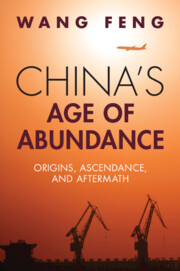‘Wang uses a lens of consumption patterns to superbly tell a unique history of China’s economic rise, deconstructing the myth of a ‘China development model’ in the process. Wang also interrogates what will happen to China’s age of abundance as population ageing and structural welfare imbalances inflict their toll, and why the rest of the world should care. Rich in its globally comparative probing, this lively book speaks to a diverse readership.’
Rachel Murphy - University of Oxford
‘Clear and insightful, Wang Feng's Age of Abundance offers a fresh and intriguing perspective on China's epic economic rise - and the challenges ahead.’
Michael Shuman - the Atlantic Council
‘This book grounds the so-called ‘Chinese miracle’ in a combination of demographic and political circumstances that were certainly unusual, but very much understandable – at least with the benefit of Wang Feng’s very capable guidance. Showing us both how so much of China’s cheap labor became good labor and how it was kept artificially cheap even after it became highly productive, he helps us see how the country’s spectacular growth happened, why its benefits have been shared so unequally, and why rapid growth has now become so difficult to sustain. An excellent, highly readable, overview of one of the most important phenomena of our time.’
Kenneth Pommeranz - University of Chicago
‘Will China resume economic growth, surpass the United States, and become the leading global economy? Or has the Chinese economy peaked, with serious obstacles that will obstruct China’s rise? Any attempt to address this debate needs to consider this impressive new book by Wang Feng, which provides novel perspectives on the origins of China’s post-1978 boom and measures of where the country stands today in terms of consumption levels, health indicators, educational attainment levels, and much else; all providing the basis for a sober assessment of China’s future.’
Martin K. Whyte - Harvard University
‘What should one make of China-of its extraordinary rise, its enormous global ambitions, and its future-now that the breathtaking first phase of its ascendance seems to have ended and forces of gravity linked to its aging population and increasingly outdated economic and political models are taking over? There are few more important questions in today’s world and few, moreover, that are harder to answer. One of the most impressive attempts to address these questions that I’ve come across in years is a slim new book that isn’t the product, as one might expect, of an economist, historian, or political scientist. This work, China’s Age of Abundance: Origins, Ascendance, and Aftermath, is of course informed by all of these fields but is written by Wang Feng, a Chinese-born sociologist at the University of California, Irvine.’
Howard W. French
Source: Foreign Policy
‘Recommended.’
R. M. Ramazani
Source: CHOICE
‘In brief, the strong aspect of this book is that it is focuses on households and their members in China. In addition, it covers a relatively long period, which starts roughly after Mao’s death. The explanations are easy to follow in most chapters - reading the book does not require advanced skills in statistical and econometric methods, which should make it accessible to many readers. I think that the first five chapters can be used as a textbook, particularly for courses in China studies and in sociology.’
Björn Gustafsson
Source: The China Quarterly
‘By shifting attention from commonly used GDP data to consumption data, Wang presents a fresh picture of China’s four decades of high-velocity economic growth.’
Andrew J. Nathan
Source: Foreign Affairs



